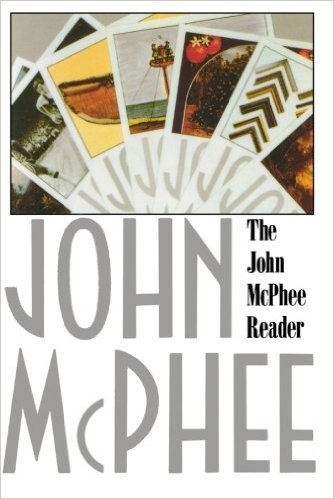Writers Read: The John McPhee Reader by John McPhee
 John McPhee writes beautifully. About anything. From conservation and aviation to art and citrus. His voice renders topic irrelevant. Relentless specificity of language is the main attraction.
John McPhee writes beautifully. About anything. From conservation and aviation to art and citrus. His voice renders topic irrelevant. Relentless specificity of language is the main attraction.
Think pieces can blur the line between journalism and literature. Between the academic and the personal. McPhee is investigative nonfiction’s spirit animal.
Even The John McPhee Reader’s ‘70s artwork with its triangular evocation of basketball, tennis ball, and orange imbues the mundane with metaphysical significance.
McPhee’s erudite, airtight essays cover everything from nuclear fission to portage. Is the implied expertise merely a front, the misdirection of a master journalist? Picture the man knee deep in materials method actor style prepping for a new assignment. His commitment to each subject is total. The rigor of the research, tangible.
“America’s most versatile journalist,” says the New York Times Book Review. True. And McPhee can spin a yarn. He is curious and curious.
In McPhee’s world, sport is both science and math. “The metaphor of basketball is to be found in these compounding alternatives,” he writes. “Every time a basketball player takes a step, an entire new geometry of action is created around him.”
Picture the man knee deep in materials method actor style prepping for a new assignment. His commitment to each subject is total. The rigor of the research, tangible.
Watch McPhee manipulate story and time in “A Roomful of Hovings,” the multi-angled impression of a former Metropolitan Museum of Art Director. Navigate these short vignettes (“Schoolboy,” “Curator,” “Fifth Avenue”) without the reassuring roadmap of sequence.
“In the museum, he’ll make the mummies dance,” says one of McPhee’s talking heads. The writer lets his characters dish out the details so he has time to meditate on things like high end art forgery.
Sometimes McPhee tags along as himself. In “Encounters with the Archdruid,” he follows two contentious environmentalists on an unlikely Colorado rafting trip. McPhee’s path of inquiry often leads us into the great outdoors.
A folksy article lingers tenderly on the people of Colonsay, Scotland. It also contains some characteristic horseplay: obscure bagpipe numbers, antiquated Gaelic, the delightful phrase “clootie-dumpling fruitcakes.” Colonsay starts to feel like home.
 Warning! Long paragraphs ahead. Dense thickets of thought envelop full pages. Readers accustomed to tidier formats may find themselves gasping for air mid-graf. Down on forest floor, McPhee cuts his winding trails with frequent comma splices. Rarely does he brandish vocabulary for its own sake. Instead, McPhee prefers sturdy, dependable technical jargon.
Warning! Long paragraphs ahead. Dense thickets of thought envelop full pages. Readers accustomed to tidier formats may find themselves gasping for air mid-graf. Down on forest floor, McPhee cuts his winding trails with frequent comma splices. Rarely does he brandish vocabulary for its own sake. Instead, McPhee prefers sturdy, dependable technical jargon.
The multiple braids of “The Search for Marvin Gardens” weave together surreal gameplay, Monopoly lore, and snapshots of life in Atlantic City. Marvin Gardens is a placeholder for paradise and prison. “Colonel Sanders’ fried chicken is on Kentucky Avenue.” Classic McPhee.
These essays circle their subjects with caution. Always they abstain from overt conclusions. “It’s obviously helpful to a basketball player to be able to see a little more than the next man,” goes a line from “A Sense of Where You Are.” McPhee might well be speaking of the writing life. The dogged pursuit of a vision.





